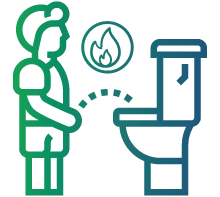
Urine Culture and Sensitivity, Aerobic
Urine Culture and Sensitivity, Aerobic
A urine culture and sensitivity, aerobic test, is a routine test that checks a urine sample for the presence of disease-causing organisms such as bacteria that can seriously damage the body's immune system and internal organs. Urine contains low levels of microbes, which travel from the outer surface of the skin to the urinary tract, where they grow and multiply, causing a urinary tract infection (UTI). Kidneys filter the blood to produce urine.
This test is used to diagnose urinary tract infections (UTIs), which are caused by gram-negative aerobic or facultative anaerobic bacilli like Escherichia, Klebsiella, Aerobacter, Proteus, and Pseudomonas species.
Symptoms of a Urinary Tract Infection

Painful or difficult urination

Frequent urge to urinate

Burning sensation while urination

Change in the urine color and appearance

Pain in the Lower abdomen (belly)

Unexpected fever

Tiredness
Who should get a urine culture & sensitivity test?
A urine culture test is recommended for adults who get frequent or hard-to-treat UTIs. UTIs can affect all genders, but women are more commonly affected than men. Risk factors for frequent UTIs include:

Diabetes

Frequent intercourse (having multiple sexual relations)

Kidney diseases such as kidney stones

Problems with emptying the bladder completely

Weakened immune system due to autoimmune disorders, organ transplant or cancer treatments
Test preparation
No special preparation is required to take the urine culture and sensitivity test. Some antibiotics can affect the test results, so make sure that your doctor is aware of any antibiotics that you have taken before the test. Before the test, your doctor may ask you to:
· Avoid peeing for at least an hour before collecting the sample.
· Drink water before the sample collection to ensure there is enough urine for testing.
· Collect the urine sample after waking up in the morning.
Interpretation of the Test Results
The range for normal test results differs between laboratories.
|
Reference Range |
Interpretation |
|
>100,000 colonies/ml |
Positive |
|
10,000-100,000 colonies/ml |
Indeterminate |
|
<10,000 colonies/ml |
Negative |
Positive urine culture test result
If the urine culture and sensitivity test results were positive, it means that bacterial colonies were found in your urine sample. This suggests that you likely have a urinary tract or bladder infection. Most UTIs are caused by E. coli, which is often found in your stool. Other bacteria that cause UTIs include Staphylococcus and Proteus.
Negative urine culture test result
If the urine culture and sensitivity test results were negative, it means that no bacterial colonies were found in your urine sample. This means that you don’t have a UTI. The range for normal test results differs between laboratories.
FAQs
What is the purpose of urine culture and sensitivity tests?
Urine culture and sensitivity, the aerobic test, helps in diagnosing specific bacterial species causing urinary tract infections, guiding the clinician in providing appropriate treatment for an individual patient, preventing bacterial drug resistance for urinary tract infections, and controlling inappropriate usage of antibiotics in clinical practice
What are the risks involved in a urine culture and sensitivity test?
This test involves no risk when the sample is collected using the “clean catch method”. You may experience discomfort if your doctor uses a catheter for sample collection, and there is a very small risk of a perforation (hole) in the urethra or bladder
What is the turnaround time (TAT) for the results of a urine culture and sensitivity test?
The test results of urine culture and sensitivity are generally available within 3–4 business days after the sample collection. You may receive your test results via email or regular mail, or you can receive a call from the doctor's office to go over the results of the urine culture and sensitivity or to schedule a follow-up appointment
Can urine culture and sensitivity test give false-negative results?
Test results are not always accurate. You may get a false-negative urine culture and sensitivity test result if you have been taking antibiotics, or you may get a false-positive test result if the urine sample has been contaminated with bacteria normally found on the skin. So, it is advisable to consult your healthcare provider before taking this test
What should I do if I have a positive urine culture and sensitivity test result?
A positive urine culture and sensitivity test result mean you have a UTI. Your doctor will prescribe the appropriate antibiotics based on the specific bacteria found in your sample, your medical history, and whether your UTI has been recurrent or not. You will be advised to drink plenty of water and urinate frequently

